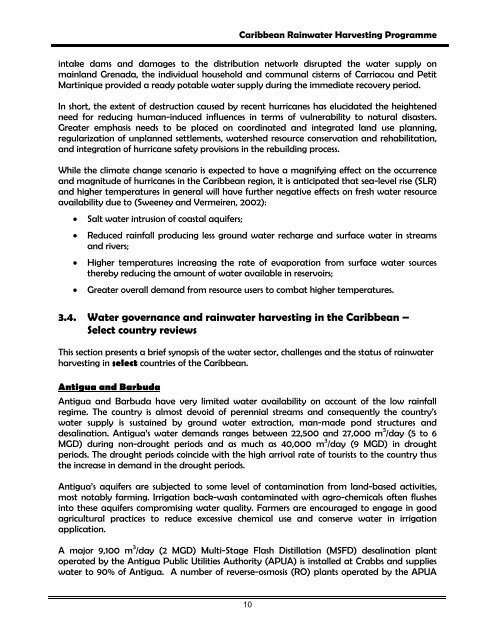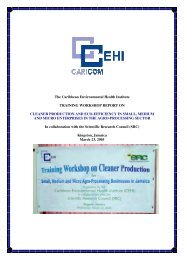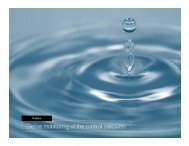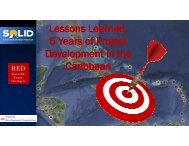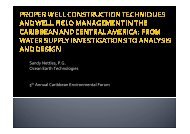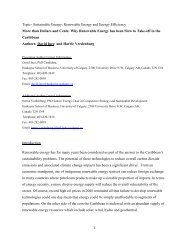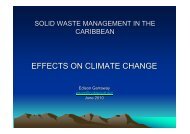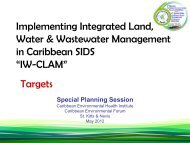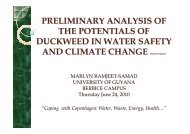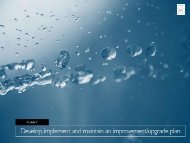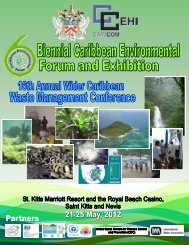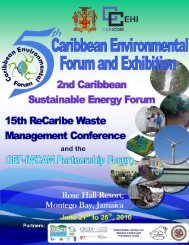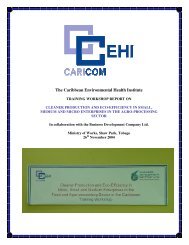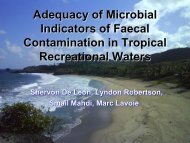<strong>Caribbean</strong> <strong>Ra<strong>in</strong>water</strong> <strong>Harvest<strong>in</strong>g</strong> Programme<strong>in</strong>take dams and damages to <strong>the</strong> distribution network disrupted <strong>the</strong> water supply onma<strong>in</strong>land Grenada, <strong>the</strong> <strong>in</strong>dividual household and communal cisterns of Carriacou and PetitMart<strong>in</strong>ique provided a ready potable water supply dur<strong>in</strong>g <strong>the</strong> immediate recovery period.In short, <strong>the</strong> extent of destruction caused by recent hurricanes has elucidated <strong>the</strong> heightenedneed <strong>for</strong> reduc<strong>in</strong>g human-<strong>in</strong>duced <strong>in</strong>fluences <strong>in</strong> terms of vulnerability to natural disasters.Greater emphasis needs to be placed on coord<strong>in</strong>ated and <strong>in</strong>tegrated land use plann<strong>in</strong>g,regularization of unplanned settlements, watershed resource conservation and rehabilitation,and <strong>in</strong>tegration of hurricane safety provisions <strong>in</strong> <strong>the</strong> rebuild<strong>in</strong>g process.While <strong>the</strong> climate change scenario is expected to have a magnify<strong>in</strong>g effect on <strong>the</strong> occurrenceand magnitude of hurricanes <strong>in</strong> <strong>the</strong> <strong>Caribbean</strong> region, it is anticipated that sea-level rise (SLR)and higher temperatures <strong>in</strong> general will have fur<strong>the</strong>r negative effects on fresh water resourceavailability due to (Sweeney and Vermeiren, 2002):• Salt water <strong>in</strong>trusion of coastal aquifers;• Reduced ra<strong>in</strong>fall produc<strong>in</strong>g less ground water recharge and surface water <strong>in</strong> streamsand rivers;• Higher temperatures <strong>in</strong>creas<strong>in</strong>g <strong>the</strong> rate of evaporation from surface water sources<strong>the</strong>reby reduc<strong>in</strong>g <strong>the</strong> amount of water available <strong>in</strong> reservoirs;• Greater overall demand from resource users to combat higher temperatures.3.4. Water governance and ra<strong>in</strong>water harvest<strong>in</strong>g <strong>in</strong> <strong>the</strong> <strong>Caribbean</strong> –Select country reviewsThis section presents a brief synopsis of <strong>the</strong> water sector, challenges and <strong>the</strong> status of ra<strong>in</strong>waterharvest<strong>in</strong>g <strong>in</strong> select countries of <strong>the</strong> <strong>Caribbean</strong>.Antigua and BarbudaAntigua and Barbuda have very limited water availability on account of <strong>the</strong> low ra<strong>in</strong>fallregime. The country is almost devoid of perennial streams and consequently <strong>the</strong> country’swater supply is susta<strong>in</strong>ed by ground water extraction, man-made pond structures anddesal<strong>in</strong>ation. Antigua’s water demands ranges between 22,500 and 27,000 m 3 /day (5 to 6MGD) dur<strong>in</strong>g non-drought periods and as much as 40,000 m 3 /day (9 MGD) <strong>in</strong> droughtperiods. The drought periods co<strong>in</strong>cide with <strong>the</strong> high arrival rate of tourists to <strong>the</strong> country thus<strong>the</strong> <strong>in</strong>crease <strong>in</strong> demand <strong>in</strong> <strong>the</strong> drought periods.Antigua’s aquifers are subjected to some level of contam<strong>in</strong>ation from land-based activities,most notably farm<strong>in</strong>g. Irrigation back-wash contam<strong>in</strong>ated with agro-chemicals often flushes<strong>in</strong>to <strong>the</strong>se aquifers compromis<strong>in</strong>g water quality. Farmers are encouraged to engage <strong>in</strong> goodagricultural practices to reduce excessive chemical use and conserve water <strong>in</strong> irrigationapplication.A major 9,100 m 3 /day (2 MGD) Multi-Stage Flash Distillation (MSFD) desal<strong>in</strong>ation plantoperated by <strong>the</strong> Antigua Public Utilities Authority (APUA) is <strong>in</strong>stalled at Crabbs and supplieswater to 90% of Antigua. A number of reverse-osmosis (RO) plants operated by <strong>the</strong> APUA10
<strong>Caribbean</strong> <strong>Ra<strong>in</strong>water</strong> <strong>Harvest<strong>in</strong>g</strong> Programmeaugment water from <strong>the</strong> ma<strong>in</strong> facility. The APUA has also <strong>in</strong>stalled a RO plant <strong>in</strong> <strong>the</strong> sisterisland of Barbuda. This plant was commissioned <strong>in</strong> March 2005 and has a capacity of 120m 3 /day (27,000 IGPD). S<strong>in</strong>ce its commission<strong>in</strong>g, <strong>the</strong> plant had to be taken out of service <strong>for</strong>operational reasons (CEHI, 2006). A number of privately operated RO plants exist <strong>in</strong> Antiguaas well, <strong>in</strong>clud<strong>in</strong>g at St. James’ Club, Carlisle Bay Hotel, Rex Halcyon Resort and Jumby Bayresort (CEHI, 2006).To address water resource constra<strong>in</strong>ts, ra<strong>in</strong>water harvest<strong>in</strong>g has been built <strong>in</strong>to <strong>in</strong>frastructureand development policy. The Town and Country Plann<strong>in</strong>g Act requires that all dwell<strong>in</strong>gs mustbe built with facilities to store at least 3 to 4 days water requirements based on <strong>the</strong> house size;this approximates 18 m 3 (4,000 gallons) storage <strong>for</strong> every bedroom. In general <strong>for</strong> each gallonof storage, US$1.10 (EC$3.00) needs to be <strong>in</strong>vested <strong>in</strong> cistern construction. Cisterns generally costabout 6% of <strong>the</strong> house construction cost. There has been public request <strong>for</strong> <strong>the</strong> Government toconsider provid<strong>in</strong>g <strong>in</strong>centives to offset some of <strong>the</strong> cost of cistern <strong>in</strong>stallation. (Source: APUA,2006)BahamasThe Bahamas are among <strong>the</strong> <strong>Caribbean</strong>’s most water-scarce countries. These islands do nothave surface rivers and have traditionally relied on ground water and ra<strong>in</strong>water harvest<strong>in</strong>g.The groundwater reserves <strong>in</strong> <strong>the</strong> Bahamian islands lie at very shallow depths below <strong>the</strong> rocksurface and are <strong>in</strong>herently vulnerable to surface-based contam<strong>in</strong>ation sources. Additionally,<strong>the</strong> over-pump<strong>in</strong>g of boreholes has led to <strong>in</strong>trusion of sal<strong>in</strong>e water compromis<strong>in</strong>g <strong>the</strong> utility of<strong>the</strong> water. This is particularly <strong>the</strong> case <strong>for</strong> New Providence (BWSC, on-l<strong>in</strong>e source). BahamasWater & Sewerage Corporation (BWSC) has <strong>in</strong>vested <strong>in</strong> reverse osmosis as a pr<strong>in</strong>ciple strategyto process brackish and seawater to augment <strong>the</strong> country’s tremendous water demand. TheCorporation has a Mar<strong>in</strong>e Operations outfit which is responsible <strong>for</strong> <strong>the</strong> barg<strong>in</strong>g of some 19,300m 3 /day (4.25 MGD) of potable water per day (year 2000 figures) from <strong>the</strong> Andros Island wellfields (BWSC, on-l<strong>in</strong>e source). Some 88% of <strong>the</strong> population has access to pipe borne water. Itis estimated that <strong>the</strong>re are over 200 RO plants currently operational <strong>in</strong> <strong>the</strong> Bahamasproduc<strong>in</strong>g more than 4.5 m 3 /day (1,000 GPD) each. Future plans anticipate term<strong>in</strong>ation of<strong>the</strong> system of barg<strong>in</strong>g water and <strong>the</strong> commission<strong>in</strong>g of new plants with near total dependenceon desal<strong>in</strong>ation <strong>for</strong> ma<strong>in</strong> supply (CEHI, 2006).<strong>Ra<strong>in</strong>water</strong> harvest<strong>in</strong>g is a significant source of water <strong>for</strong> <strong>in</strong>dividual households on many islandsof Bahamas especially <strong>in</strong> <strong>the</strong> off-shore Abaco cays, Cat Island, and sections of Long Island,although desal<strong>in</strong>ation plants and piped distribution is <strong>for</strong>c<strong>in</strong>g less reliance on RWH. Largeartificial catchments were operational <strong>in</strong> <strong>for</strong>mer US naval bases <strong>in</strong> Eleu<strong>the</strong>ra and Mayaguana,and on Moores Island, Grand Cay, Mayaguana, and Green Turtle Cay community catchmentswere built however many have become defunct. Public <strong>in</strong>stitutions with rooftop systems arerelied on <strong>in</strong> some of <strong>the</strong> islands to serve communities. The island of Whale Cay has a pipeddistribution system that is supplied by ra<strong>in</strong>water. Industries, hotels and restaurants rely heavilyon RWH exclusively or as a back-up source (UNEP/OAS, 1997).BarbadosBarbados is a critically water-stressed country given its relatively small land area (430 km 2 or166 sq.mi.) and large population (estimated at 272,000 at 2005; UN-ECLAC, 2004), and <strong>the</strong>high level of commercial development. The country’s ma<strong>in</strong> water supply is from groundwateraquifer reserves (79% of <strong>the</strong> total fresh water resources), and 2005 estimates of production11


